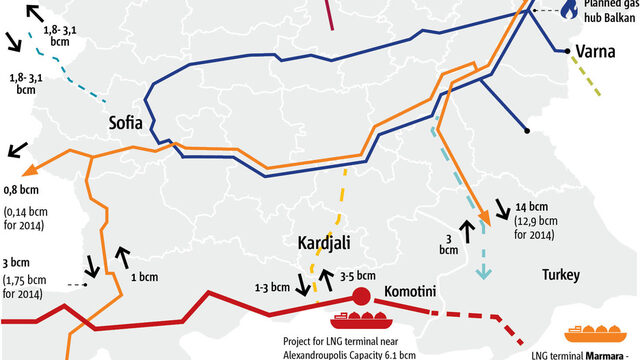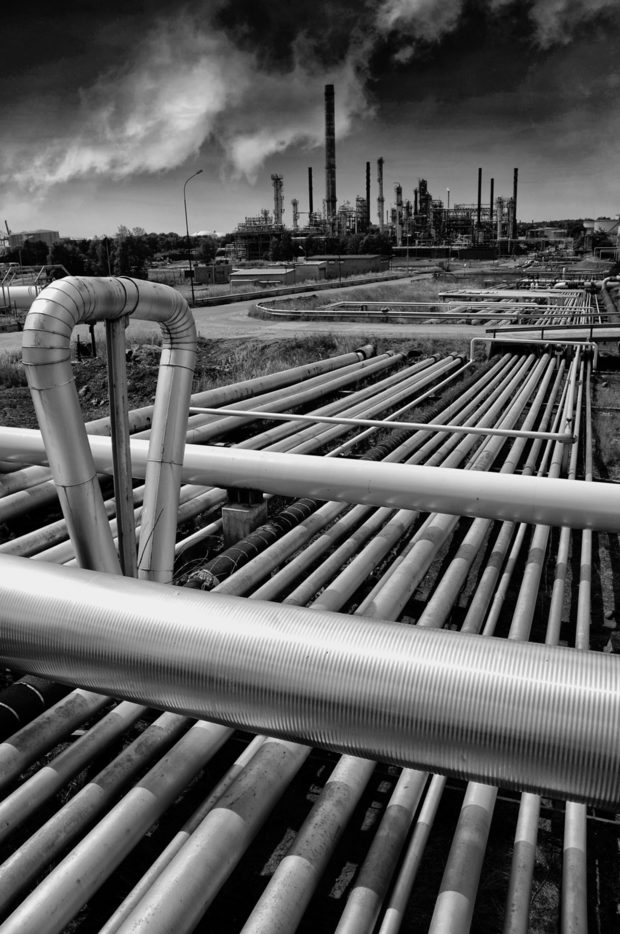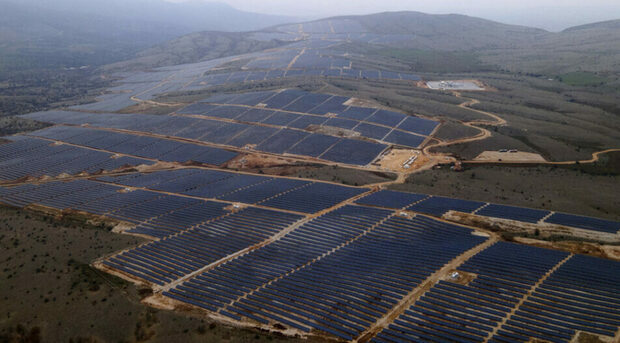Probably you have heard about the miracle gas hub Balkan, a project that will cost between one and two billion euro. It will provide Bulgaria with various gas sources, it will assure Bulgaria's central role in the future gas supply routes to Europe and will allow the country to cash in from the billions of cubic meters of gas that are supposed to flow via its transmission network. "The gas concentrator is exactly the kind of engine for the Bulgarian economy that we were looking for years, it combines significant investments with guaranteed high return", says the former Bulgarian Prime Minster Ivan Kostov (who is otherwise critical of the policies of the government led by Prime Minister Boyko Borissov).
Wow, what beast is that?
The establishment of a gas hub in Bulgaria is one of the most widely publicized priorities of Borissov's government. He never stops promoting it, he even drew a scheme of it for the European Commission President Jean-Claude Juncker who now proudly presents the scribbles in his office. The hub is so important to the government that sometimes it seems that the it subjugates its foreign and energy policies to the hub (particularly the relations with Russia) in order to ensure the green light for the project.

The idea sprung out immediately after the cancellation of South Stream - the giant Gazprom project to bypass Ukraine as a gas transit route with a new pipeline across the Black Sea, connecting Russia directly to Bulgaria. It took only a week after Russian President Vladimir Putin announced in Ankara at the end of 2014 that South Stream is dead, for the Bulgarian government to come up with its new gas infrastructure plan. The timing made two things obvious: the hub idea had been brewing for some time (and probably was discussed with Gazprom), and second, it is inextricably related to the failed South Stream pipeline. Deputy Prime Minister Tomislav Donchev, who is the main driver of the government's big energy projects, made no secret of the relation: "Without a new pipeline across the Black Sea we can't speak about a hub". The gas hub plan is only briefly described in the Bulgartransgaz's 10-year development plan. The state-owned gas transmission operator hints at the new infrastructure that needs to be built for the hub, mainly a new pipeline from the coastal town of Varna to the northwestern city of Oriahovo that broadly follows the South Stream planned route. Government officials frequently describe the prospective sources of gas - Gazprom, the Shah Deniz II consortium, LNG supplies from Greece and Turkey, and possible local production from the prospective Black Sea Khan Asparuh exploration block (developed by a consortium between Total, OMV and Repsol). It is not mentioned, however, how the market place will be organized or if there are any interested parties that will buy gas from it. All South East European countries with more or less considerable gas consumption have more supply options than Bulgaria.
There is a simple explanation for the scant information about the hub: this would be the South Stream pipeline in disguise. The Gazprom-led project failed to get Brussels' approval because it violated the EU's Third Energy Package which requires the owner of any newly built infrastructure to share it with its competitors. Gazprom didn't want that. The gas hub - in theory - could circumvent those restrictions. Gazprom will deliver the gas only to Bulgaria, claiming the Black Sea pipeline is upstream infrastructure, exempted from the EU's Third Energy Package. Then traders will buy gas from the hub and it will be transported via the Bulgarian transmission operator's own pipeline system.
The gas hub idea received approval from the European Commission. In May 2016, the EU Commissioner for Climate Action and Energy Miguel Arias Canete said that Bulgaria has the potential to become one of the important gas hubs. But the European Commission and the Bulgarian government often speak in different languages.
While the Commission emphasizes the need for Bulgaria to be connected to three different gas sources and fully implement the EU's energy competition laws, the Bulgarian government talks about huge investment plans worth up to two billion euro, conspicuously close to the price of the construction works for South Stream won by Bulgarian companies.
Sometimes it feels that Brussels encourages Bulgarian gas hub ideas in order to keep the country on track with the policies it favors. Until now it has succeeded: the project development of the Greek-Bulgarian gas interconnector is progressing, albeit slowly, and Bulgaria is liberalizing its gas market allowing more competition.
Probably you have heard about the miracle gas hub Balkan, a project that will cost between one and two billion euro. It will provide Bulgaria with various gas sources, it will assure Bulgaria's central role in the future gas supply routes to Europe and will allow the country to cash in from the billions of cubic meters of gas that are supposed to flow via its transmission network. "The gas concentrator is exactly the kind of engine for the Bulgarian economy that we were looking for years, it combines significant investments with guaranteed high return", says the former Bulgarian Prime Minster Ivan Kostov (who is otherwise critical of the policies of the government led by Prime Minister Boyko Borissov).
Wow, what beast is that?












